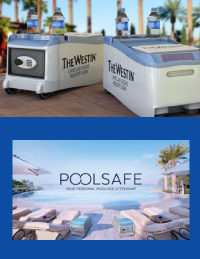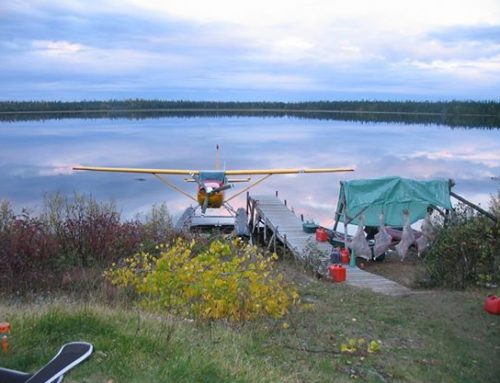The future’s bright for innovative Canadian-made product
By Cheryl Long
Swimsuit? Check. Sunscreen? Of course. Beach bag filled with all of the essentials? Ready to go. All that’s left to do is find that perfect spot either poolside or on the beach. But here comes the first challenge of the day: how do you protect your valuables when it comes time to head over to the nearest pool bar for a drink or take a refreshing swim in the ocean?
In today’s well-connected society, room keys aren’t the only items that vacationers bring to the beach. They may have their phones, cameras, iPods, iPads or even a laptop. Then there’s the cash needed to tip the friendly server at the poolside bar. The days of slipping your key and a couple of dollars inside a book are long gone — either someone stays back to keep an eye on valuables or you take the risk…or you vacation at one of the resorts worldwide that has discovered the benefits of PoolSafe.
In October 2011, long-time Canadian entrepreneur David Berger was asked to come up with an idea to help keep personal belongings safe while hotel guests were relaxing by the pool or strolling along the beach. No stranger to the world of patents and product development, Berger accepted the challenge and, when the project’s owners decided not to move forward, redeveloped the idea into what is known today as PoolSafe.
“What we see today took about a year and a half of drawings and redevelopment,” said Berger, CEO of PoolSafe Inc. “As things would come to me, I would reposition the different pieces in the actual engineering drawings. After a year and a half of drawings, we created the prototype.”
Customers from Dubai to the Bahamas
In late 2013, the prototype underwent testing and Berger began travelling to vacation destinations like Dubai and the Bahamas to showcase the Canadian-made product’s benefits. “We placed it for a couple of days in different hotels for guests to play around with it,” he explained. In May 2014, PoolSafe went into full production. Circling the globe is nothing new to Berger, who travelled approximately 120,000 air miles in 2014, visiting Arizona, Miami, London, California, Mexico and Punta Cana, among others. Late last year, he journeyed to Prague, Belgium and Costa Rica as part of his role in marketing PoolSafe.
At first glance, PoolSafe looks like a cross between a hotel safe and a small deck table. Intended to sit alongside lounge chairs, each 55-lb. solid aluminum unit combines security, convenience and guest services in its innovative design. The most obvious feature is the safe secured by a waterproof electronic key pad. Large enough to hold a 13-inch laptop and equipped with a solar USB charging port for personal electronics, the safe offers guests a worry-free way to store their room keys, cash and valuables while they enjoy resort amenities throughout the day. PoolSafe is also equipped with a call button that guests can use to contact hotel food and beverage staff, a flip lid storage compartment and holders for three cups. One of the newest features just recently introduced was a PoolSafe-specific tablet that stores inside the safe and offers guests the opportunity to place drink and food orders from their lounge chairs. Other hotel services like spa treatments could also be made available through the tablet’s easy-to-use app, Berger said.
PoolSafe’s head office and assembly plant are located in Toronto and the company has a satellite office in Miami, Florida. Though the southern state seems like an ideal market for a product like PoolSafe, they’ve in fact generated more business from Arizona to California, Berger said. Some resort chains have placed orders after setting up a demo version for a week or two; others see the product online and don’t hesitate to order sight unseen. It helps that PoolSafe is currently the only product of its kind on the market with sales that have quadrupled from 2014 to 2015.
Berger is expecting to see similar results this year achieved through two types of sales — direct, where customers purchase their PoolSafe outright, or through a revenue-sharing arrangement where PoolSafe places the safe on the resort property and receives a percentage of revenue generated through the safe’s rental fee. Most hotels or resorts charge about $20 to $30 per day to rent a PoolSafe, though the rate is substantially higher in destinations like Las Vegas, Berger said. Guests have been happy to pay the rental in exchange for the security and convenience PoolSafe provides.There’s also an opportunity for customers to generate revenue through PoolSafe by wrapping vinyl advertising around the unit. The tabletop-style surface can also be branded in the hotel’s colours.
Water parks soon to come on board
PoolSafe is building a client base that extends worldwide, ranging from resort chains in the Dominican Republic and Mexico’s Mayan Riviera to hotel groups in Spain, Dubai and throughout the United States. The latest group to take advantage of PoolSafe’s benefits is the water park market, Berger said, of which there are close to 900 in the U.S. alone. Appearing on the horizon for PoolSafe is the cruise ship industry, which is already expressing an interest in placing PoolSafe next to its onboard lounge chairs.
“In five years we’d love to see all our PoolSafes in every resort globally … and hotels and water parks,” Berger said. The future also holds possible adaptations of PoolSafe, designed with features geared to universities and nightclubs.
To learn more about the benefits of PoolSafe, visit www.poolsafeinc.com.







